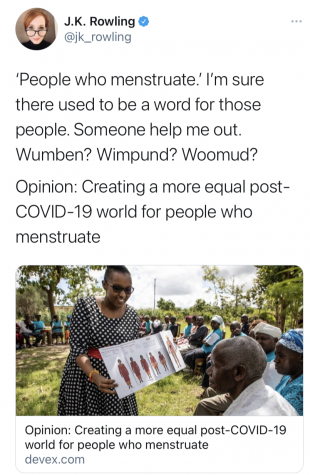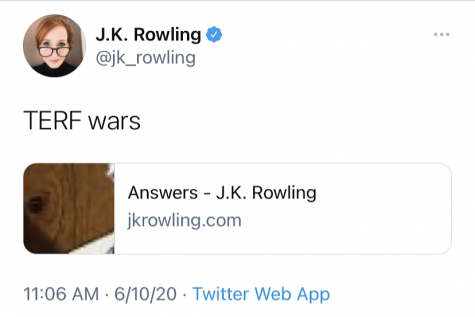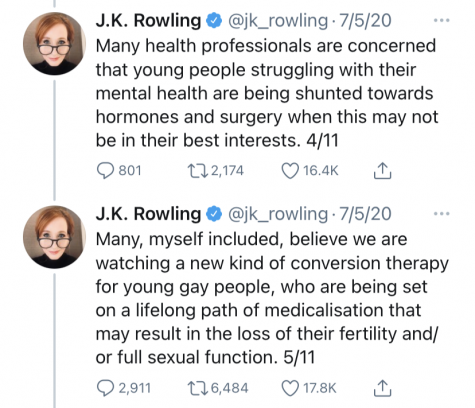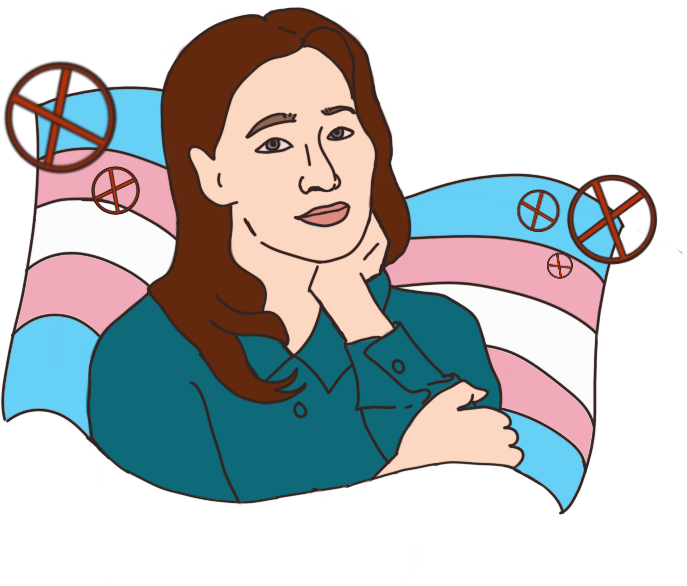Opinion: J.K. Rowling refuses to listen to the transgender community in light of her transphobic comments and opinions
January 12, 2021
The “Harry Potter” franchise is one of the highest-grossing media franchises of all time. The novels and movies have been critically acclaimed for decades, and the fandom continues to grow despite how old the series is. These achievements are all credited to J.K. Rowling– the creator of the series’ magical universe so many have immersed themselves in over the years. While Rowling has been praised for her writing and the creation of the Harry Potter Wizarding World, she has also gained immense amounts of criticism due to her poor views and opinions of issues in the transgender community.
Rowling has not always been innocent when it comes to the LGBTQ+ community. In 2007, after the completion of “Harry Potter and the Deathly Hallows”, Rowling announced that Dumbledore, a key character in the series, was gay. However, she never actually represented his sexuality in any of the novels. While some may argue that it was too late now that the series was over, it was very clear that she did not want to have this LGBTQ+ representation in her novels. The two-part sequel play, “Harry Potter and the Cursed Child” and the prequel series, “Fantastic Beasts and Where to Find Them,” both have Dumbledore in them, but not a single mention of his sexuality. This effort is more often than not known as queerbaiting. Queerbaiting is a marketing technique in which films, novels, tv shows, etc. will hint at LGBTQ+ relations but never explicitly depict them.
This act of queerbaiting has always been more hurtful than helpful in the community. It creates a false image of what an actual LGBTQ+ relationship looks like and undermines the communities trust in a franchise to give them the representation they both want and deserve. A perfect example of this would be Supernatural. After 15 seasons, many fans truly believed that Castiel and Dean Winchester would end up together, but of course, this is not what happened. For years, the show continued to depict these two as possibly being romantically involved, but never actually gave it any nuance. Fans felt as if they were robbed of a relationship that could have easily been, and the same applies to J.K. Rowling’s statements on Dumbledore’s sexuality. I think this could have easily been avoided if she very clearly said that Dumbeldore was gay at the start of the series. She should have delved deeper into his sexuality and at the very least hinted at his supposed relationship with Grimwald. It all seems like a tacky ploy to keep the community believing in her and continuing to keep the story popular years later.
Rowling continued to double down on his sexuality over the years, but still has not explicitly shown or even hinted at a gay relationship between Dumbledore and his alleged lover Grindelwald in a Harry Potter book or film. To me, it feels as though she is using his sexuality to continue to gain support from a left-leaning audience as well as gay fans of the book. And while I believe that it is important to have these sexualities portrayed in the media, I also believe that it has done nothing to help give LGBTQ+ people a sense of normalcy in a rather heteronormative society. However, if she truly is making this a characteristic of Dumbeldore to gain support from the LGBTQ+ community, why is she suddenly making hurtful comments to the trans community?
Aside from the revelation of Dumbledore’s sexuality, J.K. Rowling has had more discourse surrounding the transgender community than any other author in the past year. Starting in June and continuing to get out of hand throughout July, Rowling dug a rather large hole for herself that she can no longer seem to get herself out of. Her comments regarding transgender women, hormones, and conversion therapy were unreasonable and only seemed to be intended to hurt rather than help. This, paired with her upcoming book titled “Troubled Blood” in which a cisgender male murderer kills his female victims by dressing up as a woman in order to catch them off guard, only painted her out to be unmistakably transphobic.
June 6, 2020
J.K. Rowling quote tweeted an article with the title: “Opinion: Creating a more equal post-COVID-19 world for people who menstruate”,taking issue with this and replying “‘People who menstruate.’ I’m sure there used to be a word for those people. Someone help me out. Wumben? Wimpund? Woomud?”

This tweet caused outrage on Twitter, and for good reason. She is taking offense that the article goes out of its way to include those who menstruate considering women are not, and have not, always been the only people to menstruate. She completely ignores the fact that transgender men, nonbinary and genderfluid people, and others on the gender spectrum can also menstruate. She also ignores the fact that not all women menstruate. The ignorance in this tweet is bliss, and she doesn’t even begin to acknowledge that what she said is hurtful to the transgender community and those who look up to her and her novels.
I do not agree with how she blatantly chooses to ignore these facts to make herself look better in this situation. Instead of educating herself, she just brings up the importance of not erasing the concept of sex as she replies “I know and love trans people, but erasing the concept of sex removes the ability of many to meaningfully discuss their lives. It isn’t hate to speak the truth.” While she is not completely wrong in this statement, she also fails to see why so many people were hurt by the tweet. Sex and gender are two separate concepts. Sex refers to the biological aspects of a person, while gender refers to the socially constructed and psychological aspects. For example, a transgender woman may be assigned male at birth and have XY chromosomes, but her gender identity is female and therefore she should be treated as a woman. Rowling completely negates the difference between the two and refuses to accept that the comment she made was transphobic.
June 10, 2020
J.K. Rowling posted a tweet captioned “TERF wars” with a link to her website with a lengthy blog post titled “J.K. Rowling writes about her reasons for speaking out on sex and gender issues”.

In the 3,600 word essay, Rowling expresses her struggles with abuse, gender dysphoria, sexism, and misogyny, as well as her response to those calling her out for being a trans-exclusionary radical feminist (TERF). It is a term frequently used for transphobic people who claim to be feminists and was heavily aimed towards Rowling after her tweet on June 6. I could go on and on about the misconceptions of transgender people, and the LGBTQ+ community as a whole, she makes in her blog post; however, I believe that could be an article in and of itself. I highly recommend anyone interested in this topic to read the entire post and come up with an opinion of their own. In my opinion, there are many aspects of this ridiculously long essay that I just do not agree with- notably, her comments on allowing transgender women and men to use the bathrooms that their gender coincides with.
She makes it very clear that she believes transgender people need protection by adding that “like women, they’re most likely to be killed by sexual partners.” However, she then goes on to state that “when you throw open the doors of bathrooms and changing rooms to any man who believes or feels he’s a woman, then you open the door to any and all men who wish to come inside.” This statement is transphobic. There is nothing about this statement that screams “I want to protect and care for transgender people”. It perpetuates the notion that transgender women can be a danger to society solely because they are assigned male at birth. This statement invites the idea that transgender women should not be allowed to use a restroom made for women blatantly because they are harmful to cisgender women. Any man could go into a woman’s restroom and attack a woman, to begin with. The doors to women’s restrooms are never locked; there is no barrier that keeps men out. If a man was really going to go attack women in bathrooms, he wouldn’t do it ‘in disguise as a woman’, he would just march on in. It is a disgusting comment that is so obviously rooted in transphobic beliefs, and it only makes Rowling sound like a hypocrite. She wants to protect cisgender women only, and her 3,600-word essay in which she is supposed to be defending herself only paints her out as a woman who could care less about the transgender community.
Multiple Harry Potter actors and actresses made comments regarding the essay and their stance on her opinion. These include Daniel Radcliffe, Emma Watson, Rupert Grint, Bonnie Wright, and Evanna Lynch. They all shared their disagreement with her statements and their support for the trans community.
July 5, 2020
J.K. Rowling posts a Twitter thread in response to a tweet by user @TrinerScot that reads: “Who had money on JK Rowling pivoting to supporting those who call people who take mental health medication ‘lazy’?”: “I take daily medication to function, this sentiment is beyond offensive, it is actively harmful to millions.” The thread is 11 tweets long, and she explains her mental health problems and how she took antidepressants when she was younger. While I do not want to discredit her and her mental health issues, she compares taking antidepressants with using hormones to transition as a transgender person. I do not think the comparison between the two is fair, as it implies that hormones are used to treat a mental illness and are harmful to transgender people when it is the opposite more often than not. She continues the thread to explain why she does not agree with hormones and medication. She wrote, “Many, myself included, believe we are watching a new kind of conversion therapy for young gay people, who are being set on a lifelong path of medicalization that may result in the loss of their fertility and/or full sexual function.”

I think her original stance in comparing antidepressants to hormones was not as much of a reach, but comparing transitioning to conversion therapy is something that I could never agree with. She says this to spread awareness to the trans community so that they think about making a huge decision such as transitioning. However, she portrays detransitioning as something that happens often. In actuality, that is far from the case. According to a 2015 survey of about 28,000 people conducted by the National Center for Transgender Equality, only eight percent of the respondents reported detransitioning, and 62 percent of those people said they detransitioned only for a short time due to pressure from family members and friends. I am not disregarding the fact that there are people who have regretted their decision to transition, but it is such a small percentage of people in comparison to the number of trans people whose lives are actively improved by transitioning that it is unfair to drill this idea into the heads of younger questioning people who are more vulnerable to believing anything they read on the internet.
J.K. Rowling should not have a say in the lives of transgender people at all. As a cisgender, heterosexual, privileged white woman, she will not have to experience even an ounce of the discrimination that a transgender person will have to in their lifetime. She speaks from a place of a woman who feels threatened by transgender people, and it is obvious in the tone and wording she uses throughout these tweets.
“Harry Potter” is one of my favorite series of all time. I love the world and characters and story building, but my love for the franchise should not excuse the fact that the creator is a transphobic “feminist” who would rather speak on the lives of others than focus on educating herself on a community she refuses to listen to. She continues to make hurtful comments towards the transgender community even though she consistently says that she supports them and the LGBTQ+ community alike. She made Dumbeldore gay as a way to gain the support and trust of these communities but failed to see that her words contradicted this.

Anonymous Potterhead • Jan 28, 2021 at 4:19 pm
Vicki,
“You speak of facts when it’s only your opinion.”
Gender identity falls on a wide spectrum. We are just beginning to research this, and there are findings that support the idea that a person’s gender identity is linked to the structure and functionality of their brain. For example, a trans man’s brain may resemble a cis man’s brain more than a cis woman’s brain, and function similarly to a cis man’s brain.
https://health.clevelandclinic.org/research-on-the-transgender-brain-what-you-should-know/
Sex is defined based on genitalia, chromosomes, and secondary sex characteristics. There are a number of different sex presentations in humans.
https://www.joshuakennon.com/the-six-common-biological-sexes-in-humans/
shunning is bad • Jan 13, 2021 at 8:13 am
I suppose you would want J. K. Rowling to just change her opinion to satisfy people on Twitter. That’s a bad stance in general, because shaming/shunning isn’t a truth-seeking process, only a (vocal)-majority-confirming one. This might tend to be aligned with the truth, but it’s not inherently. It kind of doesn’t matter what J. K. Rowling believes.
I guess if you give her money by buying her books, you’re supporting her beliefs. But it seems to be against the spirit of democracy to make people’s beliefs hinge upon how much money they get. The spirit of democracy is important because social mechanisms like shunning aren’t truth-seeking, so we should allow all beliefs to be at least stated (even if not acted upon). And this applies to both government and people in everyday life.
Also, a nitpick; one could say “gender and sex are different” to support the usage of “women” instead of “people who menstruate” by saying that in this context one is using the menstruation-relevant definition of “women” (which is sort of Rowlings argument). That doesn’t seem to be much of a stretch for language and would be less verbose. On that note, I don’t think it makes sense to call her Tweet ignorant; she knows exactly what she’s trying to say.
Then again, I don’t pay attention to pop culture celebrities’ personal lives.
Vicki • Jan 12, 2021 at 10:55 am
As a full-time transsexual woman, this article is self-important, echo chamber nonsense. You speak of facts when it’s only your opinion. You say JK fails to understand when she simply has a different point of view.
And to refer to being pro-LGBT as being left-leaning simply demonstrates your lack of political knowledge and understanding and simply echoing the same political ignorance of those in the social media threads and articles you read (hence ‘echo chamber’). Being pro-LGBT does not make you left-leaning and being left-leaning does not make you pro-LGBT.
Finally, you talk of the ‘trans community’ as if we are all one voice, one opinion and that YOUR way is the ONLY way. It’s people like you, with your pontificating and supercilious finger-wagging that gives us a bad name and creates hate and dislike for us. That’s right – people like you – and not the regular or, as you would call it ‘heteronormative patriarchy’, engeders the ill-feeling towards us – with your po-faced lecturing, disapproval, insistence that you;re right and everyone else is wrong, insistence that the tail (the 1% of the world that’s trans) wags the dog (the remaining 99%), and uber-sensitive, humorless natures.
Have your opinions and have your beliefs but DON’T mistake them for anything else other than your opinions. Not even when you’re surrounded by like-minds in your echo chambers.